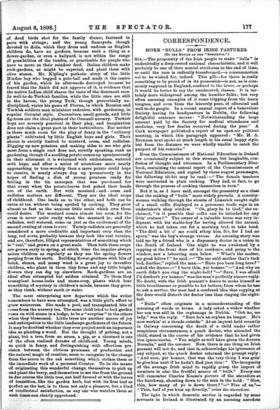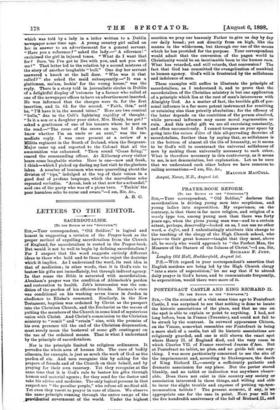CORRESPONDENCE.
MORE "BULLS" FROM IRISH PASTURES.
[To THR EDITOR OF THE " SPICCTATOR."] SIR,—The propensity of the Irish people to make " bulls " is undoubtedly a deep-rooted national characteristic, and it will probably be one of their mental attributes to the end of time, or until the race is radically transformed,—a consummation not to be wished for, indeed. This gift—for there is really something to be proud of in its possession—is not, as is com- monly supposed in England, confined to the lower, or perhaps it would be better to say the uneducated, classes. It is cer- tainly more widespread among the humbler folks ; but very often amusing examples of it come tripping from the hasty tongues, and even from the leisurely pens, of educated and well-to-do people. In a recent annual report of a benevolent - Society having its headquarters in Dublin, the following delightful sentence occurs : "Notwithstanding the large amount paid by the Society for medical attendance and medicine, very few deaths occurred during the year." A
Cork newspaper published a report of an open-air political meeting, in which this paragraph appeared : "Mr. M. A. Brennan next spoke at much length in his usual happy style, but from the distance we were wholly unable to catch the purport of his remarks."
Even the Commissioners of National Education in Ireland are occasionally subject to this strange, but laughable, con- fusion of thought and utterance. In a Parliamentary Blue- book, containing the annual report of the Commissioners of National Education, and signed by these august personages, the following tit-bit may be read :—" The female teachers were instructed in plain cooking. They had, in fact, to go through the process of cooking themselves in turn."
Bat it is, as I have said, amongst the peasantry as a class that the making of " bulls " more widely prevails. A country- woman walking through the streets of Limerick caught sight of a small coffin displayed as a gruesome trade sign in an undertaker's shop window. "Oh, glory be to God," she ex- claimed, "is it possible that coffin can be intinded for any livin' crature ? " The owner of a valuable horse was very in- dignant with his stable-boy for having allowed the animal, which he had taken out for a morning trot, to take head. "The divil a bit o' me could sthop him, Sir, for I had no spurs," was the boy's strange excuse. An amusing story was told me by a friend who is a dispensary doctor in a union in the South of Ireland. One night he was awakened by a rapping at the front door of his residence, and going to the window, saw a labouring man below. "What's the matter, my good fellow ? " he said.—" 'Tis me ould mother that's tuck bad, docther," replied the man.—" Have you been long here ? " asked the doctor.—" I have thin, yer honner."—" And why on earth didn't you ring the night-bell ? "—" Sare, I was afraid I'd diethurb yer honner," was the man's perfectly sincere reply. No doubt, with the Irish peasant's desire to make himself as little troublesome as possible to his betters, from whom he has to ask a service, the man had a confused idea that rapping at the door would disturb the doctor less than ringing the night- bell.
" Bulls " often originate in a misunderstanding of the meaning of words or terms. A lady asked a widow whether her son was still in the orphanage in Dublin. " Och no, me lady," was the reply. "Sure he's an orphan no longer. He's now workin' at a thrade outside." At an inquest held recently in Galway concerning the death of a child under rather suspicious circumstances, a quack doctor, who attended the child, stated in the course of his evidence that he had given him ipecacuanha. "You might as well have given the Aurora Borealis," said the coroner. Now, there is one thing an Irish peasant will not do, and that is, acknowledge his ignorance of any subject, so the quack doctor returned the prompt reply : " And sure, yer honner, that was the very thing I was goin' to give him next if he hadn't died just thin !" The incapacity of the average Irish mind to rapidly grasp the import of numbers is also the fruitful source of "bulls." Every one will remember Charles Keane's picture of the stevedore at the hatchway, shouting down to the men in the hold : "Now, thin, how many of ye is down there ?"—" Five of us."— " Thin, half of yes kutn up directly," cries the stevedore.
The light in which domestic service is regarded by some servants in Ireland is illustrated by an amusing anecdote which was told by a lady in a letter written to a Dublin newspaper some time ago. A young country girl called on her in answer to an advertisement for a general servant. "Have you a reference?" asked the lady.—" A riference! " exclaimed the girl in injured tones. "What do I want that for ? Sure, 'tis I've got to live with you, and not you with me I " That letter led to the relation by a second mistress of the story of another laughable "bull." One day her servant answered a knock at the hall door. "Who was it that called?" she asked the maid subsequently.—" It was a gintleme.n, ma'am, lookin' for the wrong house," was the reply. There is a story told in journalistic circles in Dublin of a delightful display of 'cuteness by a farmer who called at one of the newspaper offices to have an advertisement inserted. He was informed that the charges were 6s. for the first insertion, and 2s. 6d. for the second. "Faith, thin," said he, "I'll have it in the second toime." Here are two comical "bulls," due to the Celt's lightning rapidity of thought : "Is it a son or a daughter your sister, Mrs. Healy, has got?" asked a gentleman of one of his tenants whom he met on the road.—" The curse of the crows on me, but I don't know whether I'm an uncle or an aunt," was the im- mediate reply. I was once present at a review of a Militia regiment in the South of Ireland, when the Sergeant- Major came up and reported to the Colonel that all the ammunition was exhausted. "Then sound 'Cease firing," roared the commanding officer. At Killarney every visitor hears some laughable stories. Here is one—new and fresh,
think—which I picked up daring my last visit to the glorious lakes. A number of boatmen who were quarrelling about the division of "tips," indulged at the top of their voices in a good deal of profane language, which the marvellous echo repeated verbatim. "Arrah, look at that now for a schandal," said one of the party who was of a pions turn. " Tachin' the poor harmless echo to curse and sware."—I am, Sir, Sze.,
A. B. C.



































 Previous page
Previous page